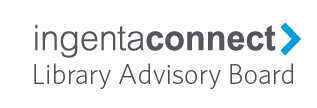by Melissanne Scheld, Managing Director
Publishers Communication Group
Library Bulletin, Summer 2015
Publishers Communication Group and ingentaconnect, two divisions of Ingenta, recently established a corporate Library Advisory Board in order to hear directly from librarians around the globe. Our goal is to provide a forum for academic librarians to discuss the challenges and benefits of acquiring and distributing academic content to their patrons. We hope to have several meetings a year during major librarian conferences and to distribute notes more widely to anyone who might benefit from the insights of our participating librarians.

During our first call, we were immediately struck by how willing everyone was to share their experiences and especially how generous they were with the most precious resource: time! To honor this, we jumped right in with a complex question: What do libraries need from publishers to make wise acquisition choices?
Anja reported that at Utrecht University their goal is to stop paying for content and to use their funds for publishing services (traditional purchases vs. OA initiatives). When it comes to the role of a sales agent, Anja expects agents to record and report on more than just downloads and usage stats; she’s looking for details such as:
They now expect greater transparency of the relationship between publishers and authors.
Annie at Syracuse is looking for content that is ‘shelf ready’ and doesn’t require staff to do much to upload/prepare, given how short-staffed they are. She also faces issues with discoverability. They use ProQuest’s Summon Service, but still need help knowing what they have.
Katie at Fredonia highlighted their struggles with funding. This mid-sized public institution has historically been liberal arts focused but there is a shift to towards a science curriculum. While the university is funding a new building for the sciences, the library’s budget did not shift. Science packages are expensive for them but they do prefer these as having to upload many individual titles is also expensive.
Each library is its own microcosm and we wondered what patterns might exist for who on campus drives your acquisition decisions?
At Utrecht, it’s mixed. Anja explained that historically it was exclusively the librarians but now they are trying to work more closely with the researchers/academics. The faculty keep a library budget so they can be influential, plus the Dean weighs in.
Syracuse works similarly, but doesn’t do as far as asking researchers to look at specific packages; the library makes final decisions based on the academics’ feedback – feedback from both actual demand (usage reports), from conversations and from studying what scholars are researching and teaching on campus. The library is apprised of new courses and changes to the curricula.
At Fredonia, they have a similar process and as a smaller institute regular contact with faculty is easier. If a request isn’t affordable, the library lets staff know, sometimes resulting in the library bearing the brunt of the frustration even though it’s the limits of the budget that force unpopular decisions. In one extreme case where the content was absolutely essential but there was no more budget, they appealed to the Dean’s Office who made the purchase.
The final question was a bit more open-ended as we asked the librarians: What needs to change?: The top three responses we heard were:
Quite a wide-range of questions and extremely useful responses from this very thoughtful group. We look forward to further exploring these and new issues at our next session in July (at LIBER).
The Board is comprised of Anne Rauh from Syracuse University, Katie Sacco (SUNY Fredonia), Anja Smit (Utrecht University), Karin Bystrom (Uppsala University), Ramesh Gaur (Jawaharlal Nehru University), Anne Maskell (UK House of Lords), Maria Soledad Bravo-Marchant (Secretaria Ejecutive de la Corporación Cincel, Chile), and Elizabeth Killeen (Imperial College, London).